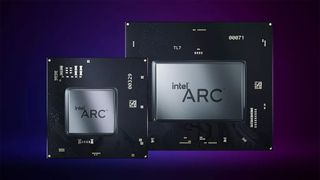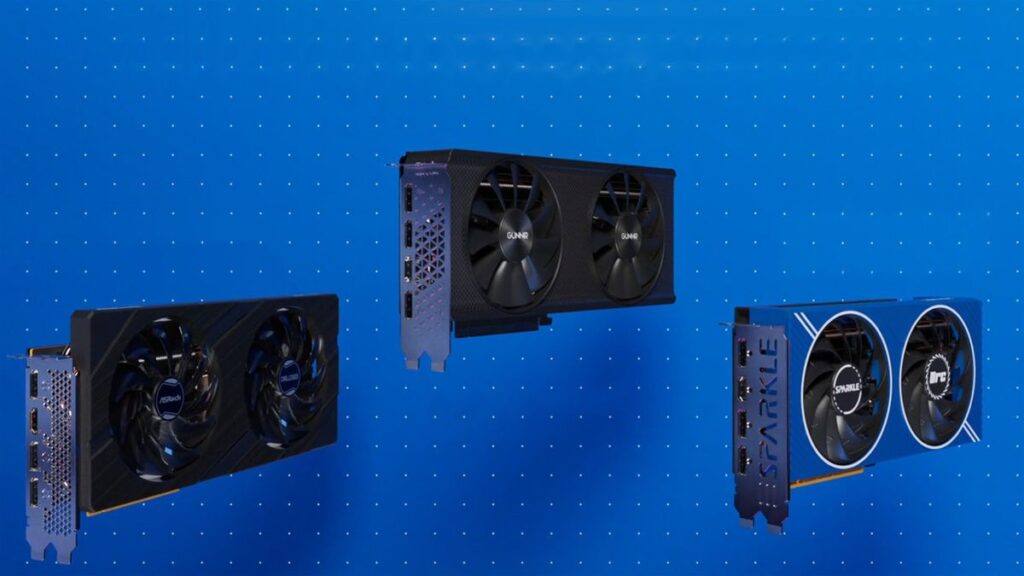- Intel’s Arc B580 GPU has been leaked via a Geekbench result
- The score itself is meaningless, but it provides key spec details
- B580’s core count could be lower than A580, but other specs might balance that out
Intel’s Battlemage graphics cards are supposedly set to launch in December if the rumors are right, and we’ve got another nugget suggesting that – a glimpse of the purported spec of the B580.
That Arc Battlemage B580 GPU is purportedly going to be the first of Intel’s 2nd-gen desktop graphics cards out of the door, and VideoCardz noticed that Tomasz Gawroński flagged up a Geekbench result on X.
Intel g21 battlemage 20core (160cu) at 2850mhz + 285k tested in geekbench. https://t.co/UJPG9iCjVV pic.twitter.com/G0emVzggN3November 26, 2024
The benchmark result itself is pretty meaningless – it’s a sample B580 (in theory, we should add – sprinkle seasoning liberally), and the OpenCL score is hardly a useful metric for a gaming graphics card anyway.
The key point here is the specs shown for the B580, which is apparently set to be loaded with 12GB of VRAM and a boost clock running up to 2.85GHz. We also learn that this GPU has 160 Compute Units (CUs).
As VideoCardz points out, this should mean the B580 has 20 Xe2 cores (with 8 CUs per core in theory).
It’s also worth noting that the video memory spec aligns with a previous leak about an ASRock B580 graphics card, which was also shown with 12GB. And at 2.8GHz, the previous clock speed was in the same area as this new leak too.

(Image credit: Intel)
Analysis: Don’t panic over those specs
So how do these specs seem to be shaping up? There’s some consternation from some of those commenting online about the drop in core count compared to the existing Arc A580 GPU – as the A580 has 24 cores versus 20 here.
{ window.reliablePageLoad.then(() => { var componentContainer = document.querySelector(“#slice-container-newsletterForm-articleInbodyContent-fJaNnspVPA5k92t66wMpEP”); if (componentContainer) { var data = {“layout”:”inbodyContent”,”header”:”Get daily insight, inspiration and deals in your inbox”,”tagline”:”Sign up for breaking news, reviews, opinion, top tech deals, and more.”,”formFooterText”:”By submitting your information you agree to the Terms & Conditions and Privacy Policy and are aged 16 or over.”,”successMessage”:{“body”:”Thank you for signing up. You will receive a confirmation email shortly.”},”failureMessage”:”There was a problem. Please refresh the page and try again.”,”method”:”POST”,”inputs”:[{“type”:”hidden”,”name”:”NAME”},{“type”:”email”,”name”:”MAIL”,”placeholder”:”Your Email Address”,”required”:true},{“type”:”hidden”,”name”:”NEWSLETTER_CODE”,”value”:”XTR-D”},{“type”:”hidden”,”name”:”LANG”,”value”:”EN”},{“type”:”hidden”,”name”:”SOURCE”,”value”:”60″},{“type”:”hidden”,”name”:”COUNTRY”},{“type”:”checkbox”,”name”:”CONTACT_OTHER_BRANDS”,”label”:{“text”:”Contact me with news and offers from other Future brands”}},{“type”:”checkbox”,”name”:”CONTACT_PARTNERS”,”label”:{“text”:”Receive email from us on behalf of our trusted partners or sponsors”}},{“type”:”submit”,”value”:”Sign me up”,”required”:true}],”endpoint”:”https://newsletter-subscribe.futureplc.com/v2/submission/submit”,”analytics”:[{“analyticsType”:”widgetViewed”}],”ariaLabels”:{}}; var triggerHydrate = function() { window.sliceComponents.newsletterForm.hydrate(data, componentContainer); } if (window.lazyObserveElement) { window.lazyObserveElement(componentContainer, triggerHydrate); } else { triggerHydrate(); } } }).catch(err => console.error(‘%c FTE ‘,’background: #9306F9; color: #ffffff’,’Hydration Script has failed for newsletterForm-articleInbodyContent-fJaNnspVPA5k92t66wMpEP Slice’, err)); }).catch(err => console.error(‘%c FTE ‘,’background: #9306F9; color: #ffffff’,’Externals script failed to load’, err)); ]]>
Sign up for breaking news, reviews, opinion, top tech deals, and more.
However, there’s give and take in these specs. If the core count is dropped to 20 (and it may not be), those are still next-gen Xe2 cores benefiting from a new, faster architecture. On top of that, the boost clock is much faster than the A580 (which is officially clocked at 1.7GHz, although third-party models ran at 2GHz or so – but 2.8GHz is a big leap over that).
Furthermore, you’ve got a more comfortable loadout of VRAM here at 12GB versus 8GB (even though, if the rumors are right, memory bandwidth will be a touch tighter with the B580 versus the A580).
All of this remains speculation, and we should bear in mind two points here. Firstly, the B580 will be appreciably faster than the A580, whatever happens. Intel would look foolish if it was otherwise, obviously enough. And secondly, no matter where the spec comes out, Intel can still attack at the low-end of the GPU market by pricing the B580 to undercut AMD and Nvidia’s budget offerings.
With all these leaks springing up around Battlemage in the past week or two, it seems fairly certain that we will see the B580 unveiled next month – but clearly, we can’t be sure of that (and even if it’s Intel’s intention right now, a last-minute delaying factor could still interfere).
It makes sense that Intel will want to grab the desktop GPU limelight for a while before AMD and Nvidia bring out their big guns (or medium-sized artillery, perhaps, in the case of RDNA 4) at CES 2025 in January as the grapevine insists.

